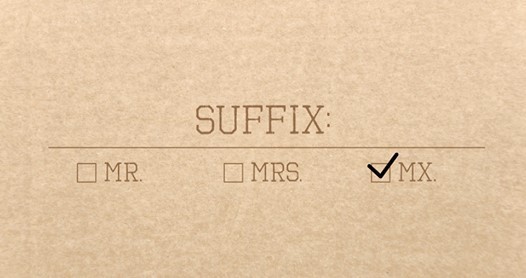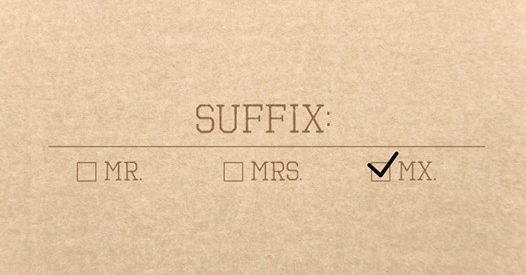Gender Neutral and Nonbinary-Exclusive Language; A Small Guide
 the word ?Suffix? with a line under it. Three boxes. One Mr., one Mrs., and one Mx. Only the Mx. box is checked.
the word ?Suffix? with a line under it. Three boxes. One Mr., one Mrs., and one Mx. Only the Mx. box is checked.
I have a job where I interact with thousands of customers every day. They know me by name and sometimes I run into them outside of work. By special nature of my work?s location, I know a good half of the public transit drivers and office workers. One of these bus drivers lately has responded very positively to me coming out as nonbinary to him. This is not usually the case with a good deal of my customers. For this reason I feel strongly motivated to answer the questions he has for me the best way I can. He cares and is trying, and even if he?s not perfect about it what matters to me is the clear intent behind it.
The other night he asked me the question I always have the hardest time answering: ?What should I say instead of ?Ma?am? or ?Sir???. I have been asked this question at least once a day, if not more, every day for the past several years of my life. This is a hard question because there isn?t a simple one word answer. I would love if there just was a word like ?Ma?am? or ?Sir? I could offer in just a few seconds and make life that much easier, but the problem in English is that there isn?t a word like that yet. There have been suggestions made, but none of them are in any strong sort of usage. I?d never heard of any of the potential ideas when I was looking through them, and I think that a good majority of other nonbinary trans people will also not know what you meant if you used them. This would result in more confusion over the intended outcome than make it easier. However, the driver is absolutely correct! He should not be calling a nonbinary trans person ?Ma?am? or ?Sir? unless that specific individual has clarified that is okay for them in their individual case.
So I?ve decided to write this piece as a collection of alternatives and an exploration of why in this one unique instance we run into difficulties with language. If you?ve ever met a nonbinary trans person, or want to practice appropriate language before you do, or you?re working on improving because a friend or family member has come out as nonbinary ? this piece is for you! A nonbinary trans person in your life may have sent this to you in hopes that it might help, and I certainly think that it will. There are many more specific aspects of language about being a nonbinary trans person and how to talk about us, but for the most part I intend to focus on this specific question for the time being.
1. Gender Neutral Language Versus Nonbinary Exclusive Language
Gender neutral language (shortened as GNL) has existed as long as language has existed. In fact, neutral terms often come before gendered ones. Especially when language was first developing, human beings were far more likely to think of others as a ?person? than as a ?man? or a ?woman?. GNL is very important both in the perspective of de-centering masculinity and men as the origin and the default as well as being intentionally inclusive of all those who are neither men nor women. Just as ?gender non-conforming? (GNC) is a description that can apply to anyone who does not conform to gender roles ? cis or trans ? gender neutral language acts similarly. It?s for everyone and does not inherently mean or imply nonbinary-ness. Being nonbinary is something separate from generic gender-neutrality. It is a necessary tool for anyone who uses language but especially for anyone trying to ensure they refer to the nonbinary trans people in their lives and in the world properly. However, this is not the only sort of language that exists for this purpose.
Nonbinary-exclusive language (shortened as NEL) is language that takes a newer approach to pre-existing words or concepts and combines it with other aspects to form new words and new terms created intentionally for nonbinary trans people. There are many ways people do this ? I myself tend to play with words by adding the letter ?X? to them for this reason ? and this is why sometimes you may come across words you?ve never seen before. It differs from GNL because instead of relying upon terms that could apply to anyone regardless of their gender, NEL refers specifically only to nonbinary trans people in the way that men and women already get to enjoy terms positively gendered for them. Not all nonbinary trans people have an interest in NEL, because not all trans people want to be capital O Out all the time. However, it is nice and good sometimes to know that you don?t have to grasp onto words that weren?t really made for you like a last minute addition, and that there are exclusive terms there if you want them.
Nonbinary trans people are the inventors of our time. We?re pushing language and boundaries and doing our best to decipher what feels right for us. We?re a class of people that has been refused the ability to even clearly talk about ourselves for a good amount of history. All of the cultures and peoples who acknowledged us centuries ago, and who celebrated us already, were colonized and erased and murdered to the degree where recognition of us was lost to White Western Imperialism and values based in bigoted Christianity. Now we are returning to be socially recognized as society tries to undo all the damage of the past. We need these words because to be unable to understand yourself or talk about yourself accurately can be very upsetting on a personal level; but it is also confusing for those in our lives who care about us and wish to understand us better.
Both GNL and NEL are very good families to take guidance from as you work on improving your understanding of the world without the lens of ?male? and ?female? being the only two options obscuring your vision. They?re equally good and important and essential in expanding towards equal recognition and support of nonbinary people as a separate class and state of being.
2. Examples Of Nonbinary Friendly Terms and Words
Now that we?ve established the two main families of nonbinary friendly language, let?s form a mini-glossary of terms and words that can be used! This is just a very small sampling of a fraction of all the terms that are out there, but these are a few of the terms I feel are best to learn first. Keep in mind that every nonbinary individual is different. Not all people will like the same words. Always ask a nonbinary trans person before you call them something.
Generic Gender-Neutral Terms:
Friend, Associate, Buddy, Pal, Companion, Individual, Person, Accomplice, Colleague, Comrade, Acquaintance, Being, Someone, or Coworker.
GNL + NEL Terms For Family Roles:
Parent, Child, Sibling, Youth, Kid, Grandparent, Cousin, Relative
Nibling ? Nonbinary equivalent of a Niece or Nephew. People also use Niblet for this purpose
Ren/Renny ? Focusing on the ?ren? in ?Parent? to create a term similar to Mom/Mommy or Dad/Daddy. Sounds like ?wren?; the bird.
Sib/Sibler ? Nonbinary equivalent of Sister/Brother and related shortened terms.
GNL + NEL Terms For Relationship Roles:
Partner, Spouse, Paramour, Lover, Date, Sweetheart, Honey, Betrothed, Significant Other, Engaged
Theyfriend ? Nonbinary equivalent of Girlfriend/Boyfriend. You can use any pronoun in place of the ?they? in ?Theyfriend? if a person uses other pronouns.
Theyspouse ? Similar to ?Theyfriend?; use of pronouns as a suffix to create explicitly nonbinary terms. A spouse who is nonbinary.
Datefriend, Bothfriend, Lovefriend, Datemate ? Other nonbinary terms for an individual who is dating someone and is nonbinary. Up to personal choice and preference.
Nonbinary-exclusive Terms For Person:
Enby ? A shortening of the word nonbinary similar to girl/boy. Good word for a nonbinary child. Very validating word for some nonbinary people. Many nonbinary people of all ages enjoy this term, however it has a slightly feminine feel to it which can be uncomfortable for some nonbinary people. Little less than half of all nonbinary people dislike this term for multiple reasons. However, many nonbinary people do like this word. It?s best to check before using it for someone. [Not a good term for the nonbinary community at whole; it?s best to just write out the whole word!]
Androgyne ? A bit vintage, dating back to Victorian language for androgynous and/or intersex people. Means ?An androgynous individual?. Can be shortened to ?Andro? for a simpler term. Not all nonbinary people are androgynous, so again it?s good to check. Especially for nonbinary people who lean towards the feminine side of things, this term can make them especially uncomfortable. Please be considerate and always ask before using a term for someone.
Theyperson ? In following the more recent format of pronoun-based terms, a [Pronoun]person is a term interchangeable with all potential pronoun sets regardless of gender, but does allow for nonbinary-exclusive terms such as this one with less potential for misgendering or inducing dysphoria. Some nonbinary people will just prefer GNL over NEL, as intentionally outing oneself as nonbinary is not always the desire or goal for every single person.
They ? While they is a pronoun used for many nonbinary people instead of she or he [Ex: Vin is a writer and they are writing this piece right now.] it is also a potential alternative term to ?enby? for a nonbinary person for those who don?t want to write out ?nonbinary? every single time. The writer of this piece enjoys being referred to as ?a they?, or in ways similar to ?They?re a they and they?ll be taking your order? etc. (They do not enjoy being referred to as an enby!) However, some nonbinary people may find this dehumanizing as women and men are not often referred to as ?a she? or ?a he? in the same fashion. As usual, depends on the needs of each individual.
3. Nonbinary Alternative To Ma?am Or Sir And How To Use It
To answer the main question that sparked this entire piece, we first have to explore and understand a different aspect of language we currently utilize. Honorifics. An honorific is a title that is placed before a person?s name either to explain their rank, role, marital status, or assumed gender. You may also know your honorific under the term ?suffix?. All the mail you receive tends to include an honorific attached to the front of your name. Honorifics in general have also influenced a good bit of gendered language and the way we refer to other people. You?ve probably answered the question as to what your title, honorific, or suffix is hundreds of times. Many people don?t even realize how difficult this question can be for nonbinary people when a non-gendered option is not provided.
There are multiple honorifics and titles for individuals which are gender neutral linguistically. The most common honorific is the term ?Mx.? [said like ?mix?]. The x acts as a wild card, taking the usual title format of Mr and Ms, and putting in an x to remove the gender in the title. This honorific has been legally recognized by several businesses, countries, and other associations but is primarily only seen on actual paperwork in the U.K. as of this moment. Places such as Canada, Washington, California, and Oregon will likely eventually follow as they all also work towards legal recognition of nonbinary trans people. However, we are still a good ways away from ?Mx? being listed as an option everywhere.(Much less other nonbinary honorifics!) Other honorifics include: Ind., Rev., Dr., M., Misc., Mre., Msr., Myr., Pr., or Mn..
The binary-gendered honorifics we currently use are ?Mr.?, ?Mrs.?, ?Ms.?, or ?Miss?. ?Miss? is often used in a similar way to ?Ma?am? despite doubling as an honorific, and ?Mister? is often used in a way similar to ?Sir? even though ?Ma?am? and ?Sir? are not honorifics. There is linguistic precedent to using a word that doubles as an honorific in ways similar to ?Ma?am? or ?Sir?. This is why ? although it is far from perfect ? I believe the best and most recognized solution to this question for the time being is to use the honorific ?Mx? in this fashion as well. I had to think about this question for nearly a month to reach what I really believe linguistically felt the most right, as well as what would the community for the most part agree upon and be comfortable with, and this is what I believe the solution to be. Below are a few examples of either way in which ?Mx? as a term can be used.
Examples:
?Paging Mx. Tanner. You are needed in Room 24.? ? here ?Mx? is used as an honorific.
?Excuse me Mx, just need to get past you!? ? here ?Mx? is used instead of ?Ma?am? or ?Sir? without incorrectly gendering someone.
?Pardon me Mx, but I think you dropped your wallet? Yeah the ID in there says it belongs to a ?Mx. Tanner?.? ? here?s a sentence where ?Mx? is used both as an honorific and a respectful term of address.
So there you have it. My personal recommendation for what the nonbinary equivalent of ?Ma?am? or ?Sir? could be. This could always change, but I?ve been thinking about this for a long time and I think for right now where I am this is what I really do want to recommend to people. A better solution might be to remove gendered forms of address altogether, but I don?t know if that?s a realistic request to make. Plus there are many binary trans people who rely upon binary-gendered terms to validate themselves; and I think that?s equally important and worth supporting. This is likely why nonbinary trans people like me often try to provide alternatives. It?s easier to start to introduce ourselves to the masses in ways that can be more quickly understood. Regardless, I hope this small collection and discussion of language has proven helpful as a springboard for understanding the reality and variation within nonbinary trans people?s needs.
Vin Tanner is a nonbinary trans person running the TransStyleGuide project solo. They write and tweet about trans issues very regularly, especially about trans language. You can donate money to them here or here if you?re not in the US. Please email them at [email protected].


